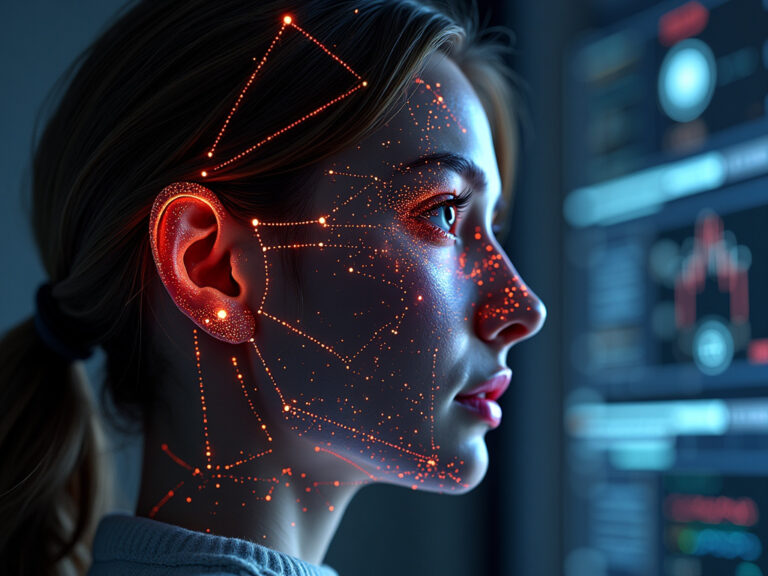Hospitals are retaining AI technology following successful cancer trials. It’s revolutionizing cancer diagnosis by enhancing data collection and seamlessly integrating into hospital systems. This technology speeds up diagnostic processes and significantly boosts accuracy, leading to better patient outcomes and streamlined hospital operations.
Key Takeaways
- AI technology speeds up and refines patient data collection, enhancing diagnostic precision.
- Hospitals using AI report fewer diagnostic errors and improved patient outcomes.
- AI systems expedite tumor detection, leading to quicker diagnoses.
- Higher detection rates of early-stage tumors and reduced false positives and negatives are among the benefits.
- Addressing data privacy, security, and bias is crucial for successful AI integration in healthcare, ensuring equitable patient care.
AI Technology Revolutionizes Cancer Diagnosis After Successful Hospital Trial
Streamlined Data Collection
Hospitals are now transforming cancer diagnosis with AI technology. This advancement allows for rapid and accurate collection of patient data. By leveraging algorithms, hospitals can analyze vast amounts of data in real-time, enhancing diagnostic precision.
Key benefits of using AI for data collection include:
- Faster processing of medical records
- Enhanced accuracy in patient histories
- Real-time updates and monitoring
These enhancements mean doctors spend less time on paperwork and more on patient care.
Integrating AI in Hospital Systems
AI seamlessly integrates with existing hospital databases. During trials, AI systems showed a significant reduction in diagnostic errors. Hospitals reported improved patient outcomes thanks to early and more accurate identification of cancerous cells.
To optimize performance:
- Ensure up-to-date software and hardware
- Train staff on AI system usage
- Regularly review and refine AI algorithms
The success of these trials illustrates AI’s potential to revolutionize the landscape of medical diagnostics.

Enhanced Accuracy and Speed in Tumor Detection
Streamlining Diagnostic Processes
AI technology has revolutionized the way hospitals detect tumors. With enhanced algorithms, AI systems can scan and interpret medical images faster than traditional methods. This rapid processing leads to quicker diagnoses, which is crucial for patients awaiting treatment.
When integrating AI into the diagnostic workflow, hospitals have observed:
- Reduction in waiting times for diagnostic results
- Increased throughput of analyzed patient data
- Enhanced clarity in imaging results
Elevated Precision in Detection
AI not only speeds up diagnostics but also significantly boosts accuracy. Traditional methods can sometimes miss early-stage tumors, but AI-driven systems excel at identifying subtle anomalies in imaging data. This precision often results from vast datasets used to train AI models, refining their capacity to catch even the minutest details. For example, a study conducted by the national health board revealed that AI improved early tumor detection rates by 15%.
Key benefits include:
- Higher detection rates for small and early-stage tumors
- Reduction in false positives and negatives
- Improved decision support for oncologists
Hospitals retaining AI technology post-cancer trials highlight the transformative impact it has had on their diagnostic capabilities. This retention underscores a commitment to providing the highest level of care with cutting-edge technology, ensuring that patients benefit from the advancements in AI.
Navigating Ethical and Technical Challenges
Data Privacy and Security
Hospitals face critical issues in safeguarding patient data when using AI. Compliance with data protection regulations like HIPAA is non-negotiable. Strategies include:
- Implementing end-to-end encryption.
- Regular security audits.
- Training staff on best data protection practices.
Bias and Fairness
AI can inadvertently introduce biases. It’s essential to ensure AI systems treat all patients fairly. Key steps include:
- Regularly updating AI algorithms.
- Employing diverse datasets.
- Conducting bias audit checks.
Integrating AI in healthcare requires careful planning, balancing technical prowess with ethical mindfulness to ensure patient safety and equity.

Expanding AI’s Medical Applications and Collaboration
Integrating AI into hospitals doesn’t stop at cancer trials. This technology transforms how medical professionals approach diagnostics, treatment plans, and patient management. AI’s role extends to various facets in healthcare, offering substantial benefits and collaboration opportunities.
AI’s applications in medical imaging and diagnostics are groundbreaking. With enhanced image recognition, AI systems accurately identify abnormalities often missed by the human eye. Radiologists can then use these insights for quicker and more precise diagnoses.
Collaboration between AI and healthcare professionals improves treatment personalization. Physicians can input patient data into AI systems to gain recommendations grounded in extensive datasets and the latest research. It helps in developing tailored treatment plans that maximize patient outcomes while minimizing side effects.
In patient monitoring, AI aids in predicting potential health issues before they become severe. Wearable devices equipped with AI algorithms track vital signs and alert healthcare providers of any irregularities. This proactive approach ensures timely intervention and better patient care.
AI also streamlines administrative tasks, reducing burdens on hospital staff. Automated scheduling, inventory management, and patient record-keeping free up time for healthcare professionals to focus more on patient care.
To see AI’s impact in action:
- Diagnosis Speed and Accuracy: AI-powered tools speed up the diagnostic process and improve accuracy, especially in radiology.
- Personalized Treatment Plans: AI analyzes patient history and current data to suggest effective treatment paths.
- Predictive Analytics for Patient Monitoring: Real-time data from wearables and hospital systems alert staff to take preventive measures swiftly.
- Operational Efficiency: Automating routine tasks saves time and minimizes human errors.
AI fosters collaboration across various medical disciplines, enhancing care quality and operational efficiency. Investing in AI technology brings both immediate benefits and long-term advancements in patient outcomes.

Patient Success Stories and Medical Staff Insights
Medical staff at various hospitals have shared countless stories of patients who defied the odds, thanks to AI technology in cancer trials. By integrating sophisticated algorithms and machine learning, doctors have observed significant improvements in patient outcomes.
Patient Success Stories
The success stories reveal the transformative potential of AI:
- Jane, Breast Cancer Survivor: Diagnosed at an advanced stage, Jane benefited from an AI-driven precision medicine approach. AI identified the best treatment regime, resulting in a full recovery and a long-lasting, cancer-free life.
- Carlos, Lung Cancer Patient: AI-assisted early detection allowed Carlos to start treatment sooner than traditional methods would. This early intervention led to more effective treatment and a better prognosis.
- Hannah, Pediatric Patient: With AI support, doctors quickly identified and treated a rare cancer type in young Hannah. Today, she’s enjoying a healthy childhood, free from the threat of recurring illness.
Medical Staff Insights
Doctors have shared their experiences and the positive impacts AI has had on their work:
- Enhanced Diagnostic Accuracy: Physicians report that AI helps in diagnosing complex cases more accurately. This minimizes the occurrence of misdiagnoses and ensures patients receive the proper treatment.
- Personalized Treatment Plans: Medical staff appreciate AI’s ability to tailor treatment plans to individual patients’ needs, responding dynamically as treatment progresses.
- Time Efficiency: AI reduces the time needed for data analysis, allowing doctors to focus more on patient care and less on administrative tasks.
The stories of patient recovery and the endorsement from medical personnel showcase AI’s promise in cancer treatment, suggesting it’s already an essential part of modern healthcare.
Recapping AI’s Transformative Impact and Future Outlook
AI has revolutionized cancer trials by enhancing precision, diagnosing patients faster, and optimizing treatment plans. Hospitals that participated in the trials witnessed several key benefits:
- Improved Diagnostic Accuracy: Machine learning algorithms detected cancerous cells with higher precision than traditional methods.
- Faster Diagnosis: AI systems processed large datasets swiftly, reducing wait times significantly.
- Personalized Treatment Plans: AI tailored treatments to individual genetic profiles, resulting in better patient outcomes.
Exciting advances continue to emerge. Future prospects look promising with AI expected to further integrate into hospital operations, improving efficiencies, and clinical outcomes. Enhanced data analytics and predictive modeling could lead to even more personalized and effective treatments. Embracing these technologies means better healthcare and potentially saving more lives.
Sources:
(blank)




